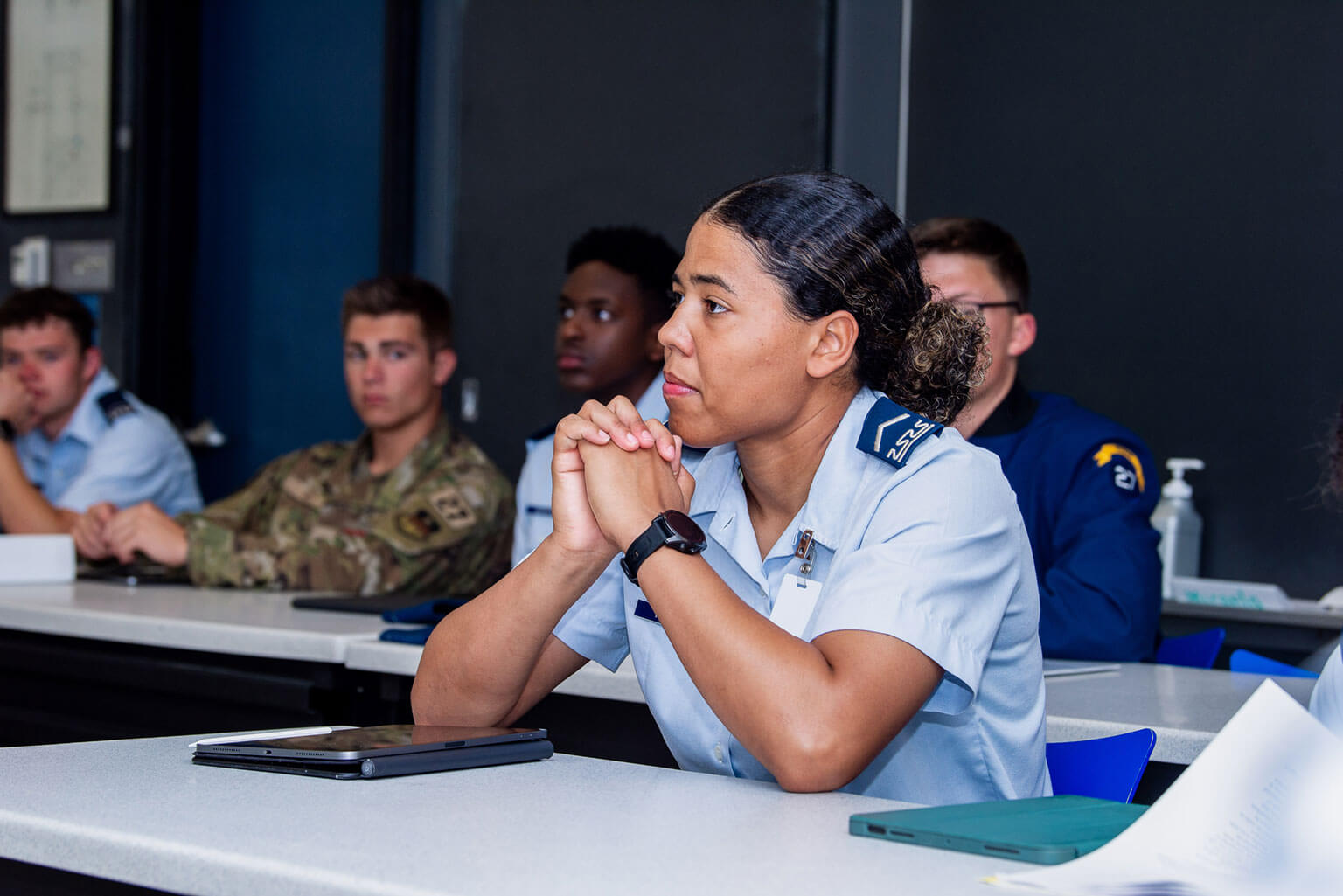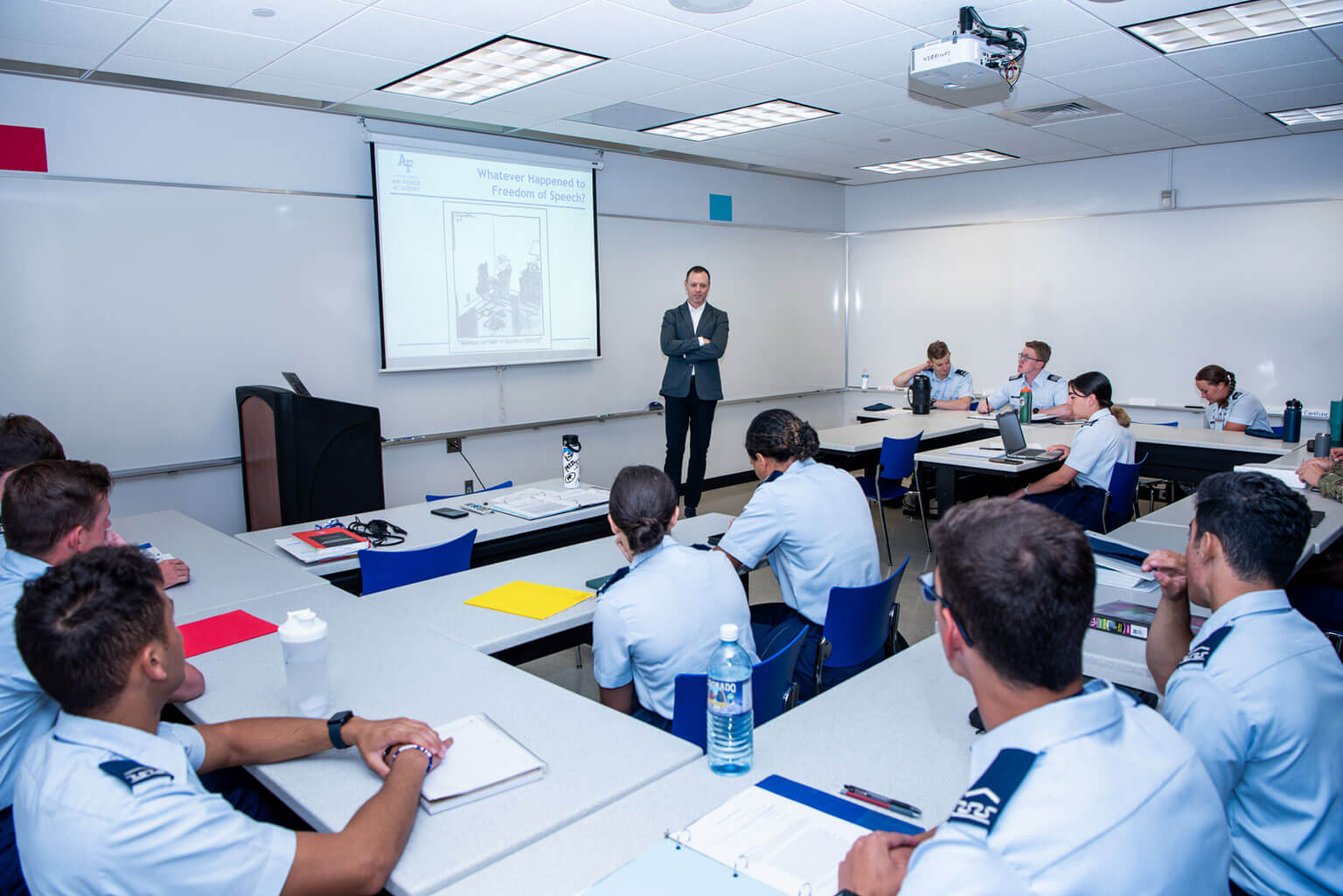Law class gives cadets legal tools they will need as officers

U.S. Air Force Academy Cadet 3rd Class Jayda McNabb listens to instruction during his Law for Department of the Air Force Officers class Sept. 3, 2024. The course introduces cadets to foundational concepts of law such as constitutional rights, criminal procedure, command discretion, and the laws of war, preparing them for the future challenges they will face. (U.S. Air Force photo by Justin Pacheco)
By Randy Roughton
U.S. Air Force Academy Strategic Communications
U.S. AIR FORCE ACADEMY, Colo. – In the required Law for Department of the Air Force Officers course, U.S. Air Force Academy Legal Studies professors tell cadets while they probably will never argue a case in a courtroom, they need to be prepared for legal situations that U.S. Air Force and U.S. Space Force officers sometimes encounter.
Gaining legal knowledge while developing as critical thinkers
The class, Law 220, covers general law knowledge and constitutional topics through examination of case law and texts. Cadets also develop communication, critical thinking and problem-solving skills as they reason through case studies and apply them to military situations. Instruction generally begins with how an area of law works in society, followed by its military application.
“Law 220 gives us opportunities to dive into the law in the context of being future officers,” said Cadet 2nd Class Natalia Wright. “All of us will need to be able to act under pressure and make critical decisions in a constantly changing world.”
Wright changed her major to Legal Studies after completing the course during her three-degree year at the Academy.
Alignment with Academy’s critical thinking institutional outcome
The class is one of the core courses directly aligned with critical thinking, one of the U.S. Air Force Academy’s nine institutional outcomes. By graduation, cadets are expected to identify and solve complex problems and effectively respond to situations they have not previously confronted.
Course director and assistant professor Shawn McKelvy believes the class serves that purpose well. Instructors are not as interested in cadet conclusions as they are with their ability to apply reason to the decision-making process. Cadets practice “thinking on their feet, in the moment and under pressure,” McKelvy said.
“We think the skills they learn in the course, as well as the major, sets our cadets up well for any field in the Air Force or Space Force and every opportunity beyond,” McKelvy said. “What we are trying to do is prepare our future officers for the future fight and any challenges they will face.”

U.S. Air Force Academy Cadet 3rd Class Cole Weir attends the Law for Department of the Air Force Officers class Sept. 3, 2024. The course introduces cadets to foundational concepts of law such as constitutional rights, criminal procedure, command discretion, and the laws of war, preparing them for the future challenges they will face. (U.S. Air Force photo by Justin Pacheco)
Facts-issue-rule-analysis-conclusion process
As a part of teaching law and developing higher-level thinking, instructors introduce the “facts-issue-rule-analysis-conclusion process. Every situation can be different when dealing with disciplinary problems in a unit and on the battlefield. Because the stakes are so high in battle, the skill of critical thinking is even that much more essential, McKelvy said. Some of the tools at commanders’ disposal include the Uniform Code of Military Justice as well as lesser administrative actions.
“In a nutshell, our course is designed to train cadets in the concept of command discretion and how that applies a healthy scrutiny and analysis to the problem,” McKelvy said. “As commanders, you have everything from the lowest administrative punishment all the way up to a court-martial to determine what the right tool set is. You can see the value of critical thinking in that it is individualized for the circumstances.”
Putting the formula into action
Law 220 Professors intentionally give cadets problems with several reasonable outcomes. The cadets evaluate the merits of each possible solution, the facts-issue-rule-analysis-conclusion formula. Cadets use the formula for every verbal or written assessment.
Through the process and other aspects of the class, Wright said she refined how she approached problem solving, a skill she knows she will need in her career.
“One of the most important skills I learned through that process was how to identify how different courts analyzed the rule I was applying in their particular cases,” Wright said. “I had to recognize where that analysis matched the key aspects of my own case to make my conclusions. It is a valuable skill to learn early because no situation we face will be exactly the same. We must build off previous ideas and solutions, adapt based on the context of the situation and create our effective solutions.”

Course director and assistant professor Shawn McKelvy teaches a class in Law for Department of the Air Force Officers course at the U.S. Air Force Academy Sept. 3, 2024. The course introduces cadets to foundational concepts of law such as constitutional rights, criminal procedure, command discretion, and the laws of war, preparing them for the future challenges they will face. (U.S. Air Force photo by Justin Pacheco)
Enduring life skills
All cadets, regardless of major, must take the course before graduation. It is not meant to be an all-encompassing law course, but cadets gain skills they will rely on in their careers after the Academy.
“For many of us, knowledge is fleeting, but the skills are enduring,” McKelvy said. “These are tools they can apply to multiple circumstances in their careers as warfighters. But you don’t just take this course and become a critical thinker. It’s a lifelong journey, but classes like Law for Department of the Air Force Officers and other core courses help you get further down that road.”